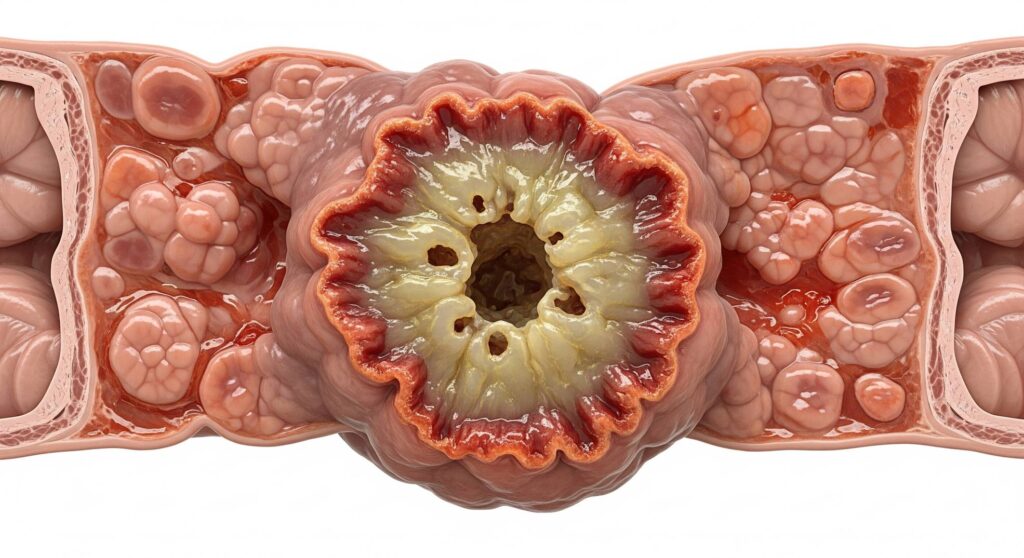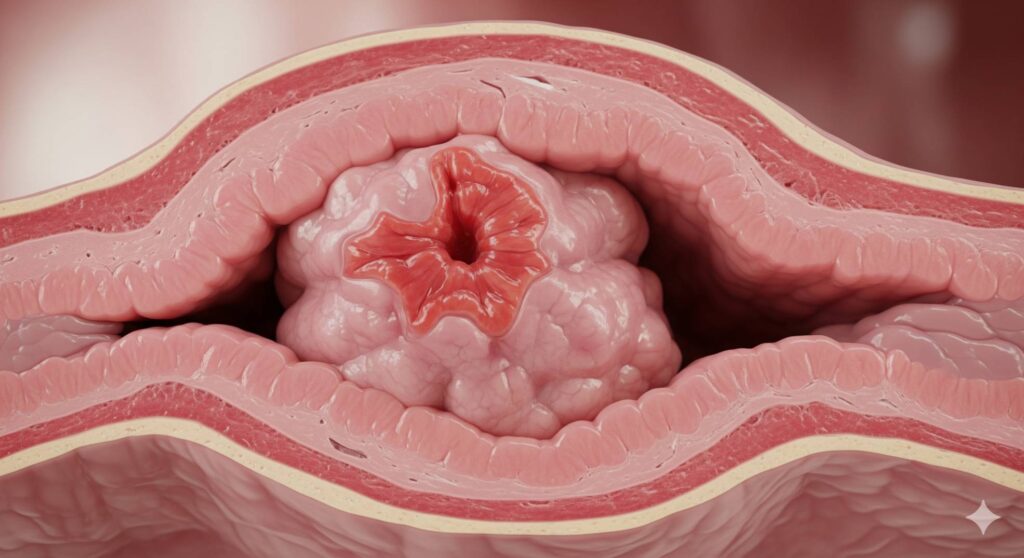Colon Cancer Symptoms – Starting
When we talk about the “Colon Cancer Symptoms”, we talk about the signs that our body give us when abnormal cells start growing in the colon or rectum. Colon cancer is also known as “colorectal cancer”. This is one of the leading type of cancer which is cause of death worldwide. What makes it more dangerous it that, it does not provide any obvious signs. But, knowing the common colon cancer symptoms can be very helpful for early detection. And we all know that, almost every big disease is curable if it is detected early.
Early detection of colon does not help only in better outcome after medication but also reduce the complications. We will discuss in detail about the signs of colon cancer, colon cancer symptoms in women, and medical coding such as colon cancer ICD 10. We will also cover the right treatments for it.

Source: American Cancer Society, World Health Organization (WHO)
What is Colon Cancer?
Now, us discuss that “What is Colon Cancer?”. The answer is, colon cancer is disease that take place in large intestine, which is the last part of large part of digestive system. Most colon cancer begins very small. Benign (noncancerous) clumps of cells is called polyps. After some time there is chance that these polyps can turn into cancer.
The colon plays an important role in absorb water and electrolyte from the digestive food, which makes it important for overall health of the body. When the cancer take place, it disturb this process and leads to the various colon cancer symptoms such as change in bowl habit, blood in stool, and abdominal pain.
Source: National Cancer Institute (NCI)

Colon Cancer Symptoms: Early Signs
The colon cancer symptoms in the starting phase are feel very common, that’s why many people ignore it. Here I am providing you some common signs,
- You fell change in your bowl habits(diarrhea, constipation, or narrowing of the stool).
- You will notice blood in your stool.
- You body will lose weight.
- You will feel abdominal pain and cramps.
- Your body will feel weak.
These signs are not common, so please don’t take it as these doesn’t matter. Please grab some time and then visit to doctor for early detection.
Source: Mayo Clinic
Colon Cancer Symptoms in Women
Now we will discuss that what is the sign of colon cancer in women, while both in men and women can develop the colon cancer. Some research shows that certain colon cancer symptoms in women are minorly different than the symptoms which appear in men due to the hormone factors, anatomy, and overall health difference. Understanding and recognizing these different unique signs can help women detect the disease earlier. Some colon cancer symptoms in women are
- Abdominal bloating and cramp – Due to the cramps, women may confuse that is this cramps are of menstrual discomfort or of other gynecological issues.
- Change in bowel movement patterns – Persist constipation or diarrhea for more than a few weeks can be a warning sign.
- Unexplained fatigue – You will feel low energy due to some internal bleeding and iron deficiency anemia.
- Blood in stool – You often ignore that because it is common of coming blood in stool. But I want you to know that it is mistaken for hemorrhoids but it is a strong sign of colon cancer.
- Unexplained weight changes – You will either suddenly gain weight or lose weight without a major change in diet or exercise.
The most complication in the case of women is that the colon cancer symptoms in women sometimes overlap with conditions such as IBS (Irritable Bowel Syndrome). That’s why, awareness is important.
Source: Centers for Disease Control and Prevention (CDC)

Risk Factors of Colon Cancer
There are also some risk factors of colon cancer. Knowing and understanding this risk factors can drastically reduce the chance of developing colon cancer symptoms in your body. Some major risks are as follows.
- Age – People above the age of 50 are at higher risk because their immunity is already weak than the younger ones. But in today’s world, colon cancer cases are rising in young adults also.
- Family history – If your close relative had colon cancer, then the risk of colon cancer developing in your body is double.
- Diet – Eating high-grade meat and processed food frequently can increase the risk of colon cancer.
- Lifestyle – Sometimes lifestyle is also responsible for this disease, such as sedentary lifestyle, obesity, smoking, and alcohol consumption can increase chances.
- Medical condition. Inflammatory bowel disease, Crohn’s disease, and diabetes can increase colon cancer risk.
Becoming aware of these risk factors allows people to undergo timely screening and reduce the chances of illness.
Source: American Cancer Society
Diagnosis of Colon Cancer
Doctors use several diagnosis methods to detect colon cancer, such as
Colonoscopy – A thin, flexible tube with a camera checks the entire colon for polyps or tumors.
Stool tests – Detect hidden blood or abnormal DNA in stool samples.
CT Colonography (Virtual Colonoscopy) – Imaging test to visualize the colon.
Biopsy – If an abnormal growth is found, a tissue sample is taken to confirm cancer.
Early diagnosis plays most important part for the right clone cancer treatment. Early diagnosis always improves the survival rate.
Source: American Cancer Society
Colon Cancer ICD 10
In the medical world, doctors and hospitals use some unique standard codes to identify the disease. For the clone cancer, the unique code is Colon Cancer ICD 10. This system is the part of the International Classification of Diseases, 10th revision, that’s why it is written as ICD-10, which is created by the World Health Organization(WHO).
The colon cancer ICD-10 codes are important because
- They help doctors and hospitals to record cases consistently worldwide.
- It allows insurance companies to process medical claims.
- It enables the research to track clone cancer statistics.
- Ensures proper treatment guidelines are followed by the hospital or medical.
The most common colon cancer ICD 10 codes are:
- C18.0 – Malignant neoplasm of cecum
- C18.2 – Malignant neoplasm of ascending colon
- C18.4 – Malignant neoplasm of transverse colon
- C18.7 – Malignant neoplasm of sigmoid colon
- C18.9 – Malignant neoplasm of colon, unspecified
By using the colon cancer ICD-10 codes, doctor can easily classify cancer based on its location and severity, which may prove very helpful for designing treatment plans.
Source: World Health Organization – ICD-10 Database

Staging of Colon Cancer
Let’s discuss about the stages of the Colon cancer. Let’s first understand that what is staging in the cancer. Staging refers to how far the cancer has spread into your body. When the patient shows Colon cancer symptoms, staging is done after diagnosis to decide the right treatment.
Stage 0 (Carcinoma in situ): Cancer is only in the inner lining of the colon.
Stage I: Cancer has grown into the colon wall but has not spread further.
Stage II: Cancer has spread through the wall but not to lymph nodes.
Stage III: Cancer has reached nearby lymph nodes.
Stage IV: Cancer has spread (metastasized) to distant organs like the liver or lungs.
Each stage of the colon cancer refers to the specific colon cancer ICD-10 codes, which make it easier for the doctor to plan the treatment and correct medical records.
Source: National Cancer Institute (NCI)
Colon Cancer Treatment
When a person first detected by colon cancer symptoms, the next crucial step should be deciding the right Colon Cancer treatment because there is no chance of regretting. Your treatment will depend fully on the stage of the cancer, overall health, and how much disease has spread to other parts of the body. The main Colon Cancer treatment includes
- Surgery – Surgery is the most common treatment which is used in Colon Cancer treatment in early stage of disease.
- Chemotherapy – It includes the usage of drugs to kill cancer cells or stop them from multiplying in the body. It is often given after surgery to destroy hidden cancer cells. Common drugs are C5-FU, Capecitabine, Oxaliplatin. It helps control advanced cancer when surgery is not enough.
- Radiation Therapy- It uses high-energy rays to kill cancer cells from the body, more commonly for rectal cancer but can be used in Colon Cancer too. It is often combined with chemotherapy to shrink tumors before surgery to make the surgery easy.
- Targeted Therapy – It focuses on specific cancer cells, genes, and proteins. Common targeted drugs like Bevacizumab (Avastin), Cetuximab (Erbitux) are used when standard treatments do not work effectively even after long-time.
- Immunotherapy – It boosts the body’s immune system to fight against colon cancer cells. It works better for patients with specific genetic changes. It also includes drugs like Pembrolizumab (Keytruda).
Lifestyle & Dietary Management During Treatment
Now let us discuss that what lifestyle and dietary management we should follow for the best treatment. Patients of the colon cancer needs to follow supportive care for better recovery.
Healthy Diet: Eat more fruits, vegetables, whole grains, and lean proteins.
Limit Red Meat: Processed and red meats increase colon cancer risks.
Stay Active: Moderate exercise improves immunity and reduces fatigue.
Hydration: Drinking enough water reduces constipation and supports digestion.
Mental Health Support: Counseling and support groups help reduce stress during treatment.
Source: Harvard Health Publishing
Conclusion
Early Detection and Immediate Recognizing the Colon Cancer Symptoms is the first step towards saving your lives as well as other lives. As this blog has explained,
The basics of colon cancer symptoms and how they appear.
Differences in colon cancer symptoms in women.
Importance of colon cancer ICD 10 coding in healthcare.
Available colon cancer treatment methods, from surgery to advanced therapies.
Preventive steps, screening, and survival rates.
By providing awareness, Our motive is only to ensure the early detection and effective treatment for Colons Cancer, which ultimately reduces the burden of Colon Cancer disease on the world.
Source: [WHO, CDC, NCI, Mayo Clinic, ACS]
